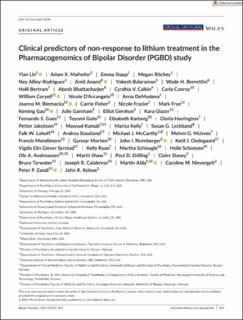Clinical predictors of non-response to lithium treatment in the Pharmacogenomics of Bipolar Disorder (PGBD) study
Lin, Yan; Maihofer, Adam X.; Stapp, Emma; Ritchey, Megan; Alliey-Rodriguez, Ney; Anand, Amit; Balaraman, Yokesh; Berrettini, Wade H; Bertram, Holli; Bhattacharjee, Abesh; Calkin, Cynthia V.; Conroy, Carla; Coryell, William; D´Arcangelo, Nicole; DeModena, Anna; Biernacka, Joanna M.; Fisher, Carrie; Frazier, Nicole; Frye, Mark; Gao, Keming; Garnham, Julie; Gershon, Elliot; Glazer, Kara; Goes, Fernando S; Goto, Toyomi; Karberg, Elizabeth; Harrington, Gloria J.; Jakobsen, Petter; Kamali, Masoud; Kelly, Marisa; Leckband, Susan G.; Lohoff, Falk W.; Stautland, Andrea; McCarthy, Michael J.; McInnis, Melvin G.; Mondimore, Francis; Morken, Gunnar; Nurnberger, John I.; Ødegaard, Ketil Joachim; Syrstad, Vigdis Elin Giæver; Ryan, Kelly; Schinagle, Martha; Schøyen, Helle Kristine; Andreassen, Ole; Shaw, Martha; Shilling, Paul D.; Slaney, Claire; Tarwater, Bruce; Calabrese, Joseph R.; Alda, Martin; Nievergelt, Caroline M.; Zandi, Peter P.; Kelsoe, John R.
Journal article, Peer reviewed
Published version

View/
Date
2021Metadata
Show full item recordCollections
- Department of Clinical Medicine [2044]
- Registrations from Cristin [9489]
Abstract
Background
Lithium is regarded as a first-line treatment for bipolar disorder (BD), but partial response and non-response commonly occurs. There exists a need to identify lithium non-responders prior to initiating treatment. The Pharmacogenomics of Bipolar Disorder (PGBD) Study was designed to identify predictors of lithium response.
Methods
The PGBD Study was an eleven site prospective trial of lithium treatment in bipolar I disorder. Subjects were stabilized on lithium monotherapy over 4 months and gradually discontinued from all other psychotropic medications. After ensuring a sustained clinical remission (defined by a score of ≤3 on the CGI for 4 weeks) had been achieved, subjects were followed for up to 2 years to monitor clinical response. Cox proportional hazard models were used to examine the relationship between clinical measures and time until failure to remit or relapse.
Results
A total of 345 individuals were enrolled into the study and included in the analysis. Of these, 101 subjects failed to remit or relapsed, 88 achieved remission and continued to study completion, and 156 were terminated from the study for other reasons. Significant clinical predictors of treatment failure (p < 0.05) included baseline anxiety symptoms, functional impairments, negative life events and lifetime clinical features such as a history of migraine, suicidal ideation/attempts, and mixed episodes, as well as a chronic course of illness.
Conclusions
In this PGBD Study of lithium response, several clinical features were found to be associated with failure to respond to lithium. Future validation is needed to confirm these clinical predictors of treatment failure and their use clinically to distinguish who will do well on lithium before starting pharmacotherapy.
